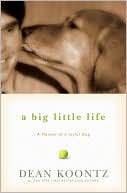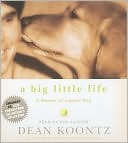Dewey: The Small-Town Library Cat Who Touched the World
How much of an impact can an animal have? How many lives can one cat touch? How is it possible for an abandoned kitten to transform a small library, save a classic American town, and eventually become famous around the world? You can't even begin to answer those questions until you hear the charming story of Dewey Readmore Books, the beloved library cat of Spencer, Iowa.Dewey's story starts in the worst possible way. Only a few weeks old, on the coldest night of the year, he was stuffed into...
Search in google:
How much of an impact can an animal have? How many lives can one cat touch? How is it possible for an abandoned kitten to transform a small library, save a classic American town, and eventually become famous around the world? You can't even begin to answer those questions until you hear the charming story of Dewey Readmore Books, the beloved library cat of Spencer, Iowa.Dewey's story starts in the worst possible way. Only a few weeks old, on the coldest night of the year, he was stuffed into the returned book slot at the Spencer Public Library. He was found the next morning by library director, Vicki Myron, a single mother who had survived the loss of her family farm, a breast cancer scare, and an alcoholic husband. Dewey won her heart, and the hearts of the staff, by pulling himself up and hobbling on frostbitten feet to nudge each of them in a gesture of thanks and love. For the next nineteen years, he never stopped charming the people of Spencer with his enthusiasm, warmth, humility, (for a cat) and, above all, his sixth sense about who needed him most. As his fame grew from town to town, then state to state, and finally, amazingly, worldwide, Dewey became more than just a friend; he became a source of pride for an extraordinary Heartland farming town pulling its way slowly back from the greatest crisis in its long history. Publishers Weekly In a world where a bad dog topped bestseller lists for years, it's inevitable that a library cat would soon make a bid to win the hearts of a nation. According to Mayron, this has already happened. Dewey is not bad, just occasionally mischievous enough to provide opportunities for the narrator to coo. Suzanne Toren wholeheartedly devotes herself to the first-person account of the author's travels with Dewey and only occasionally meanders into the sugar bowl. Dewey's story is a testament to how something small with a big heart can have an incalculable effect on a community. Anyone with at least one cat is guaranteed to get a lump in his or her throat as the orange fluff-ball connects with a severely disabled girl in one particularly affecting scene, memorably brought to life by Toren in her librarian persona. A Grand Central hardcover (Reviews, July 28). (Sept.)Copyright © Reed Business Information, a division of Reed Elsevier Inc. All rights reserved.
\ Dewey\ \ The Small-Town Library Cat Who Touched the World \ \ \ \ By Vicki Myron Bret Witter \ Grand Central Publishing \ Copyright © 2008 \ \ Vicki Myron\ All right reserved.\ \ \ ISBN: 978-0-446-40741-0 \ \ \ \ \ Chapter One The Coldest Morning \ January 18, 1988, was a bitterly cold Iowa Monday. The night before, the temperature had reached minus fifteen degrees, and that didn't take into account the wind, which cut under your coat and squeezed your bones. It was a killing freeze, the kind that made it almost painful to breathe. The problem with flat land, as all of Iowa knows, is that there's nothing to stop the weather. It blows out of Canada, across the Dakotas, and straight into town. The first bridge in Spencer across the Little Sioux, built in the late 1800s, had to be taken down because the river became so jammed with ice everyone worried the pylons would collapse. When the town water tower burned down in 1893-the straw packing used to keep the riser pipe from freezing caught fire, and all the nearby fire hydrants were frozen solid-a two-foot-thick, ten-foot-wide circle of ice slid out the top of the tank, crushed the community recreation center, and shattered all over Grand Avenue. That's winter in Spencer for you.\ I have never been a morning person, especially on a dark and cloudy January day, but I have always been dedicated. There were a few cars on the road at seven thirty, when I drove the ten blocks to work, but as usual mine was the first car in the parking lot. Across the street, the Spencer Public Library was dead-no lights, no movement, no sound until I flipped a switch and brought it to life. The heater switched on automatically during the night, but the library was still a freezer first thing in the morning. Whose idea was it to build a concrete and glass building in northern Iowa? I needed my coffee.\ I went immediately to the library staff room-nothing more than a kitchenette with a microwave and a sink, a refrigerator too messy for most people's taste, a few chairs, and a phone for personal calls-hung up my coat, and started the coffee. Then I scanned the Saturday newspaper. Most local issues could affect, or could be affected by, the library. The local newspaper, the Spencer Daily Reporter, didn't publish on Sunday or Monday, so Monday was catch-up morning for the Saturday edition.\ "Good morning, Vicki," said Jean Hollis Clark, the assistant library director, taking off her scarf and mittens. "It's a mean one out there."\ "Good morning, Jean," I said, putting aside the paper.\ In the center of the staff room, against the back wall, was a large metal box with a hinged lid. The box was two feet high and four feet square, about the size of a two-person kitchen table if you sawed the legs in half. A metal chute rose out of the top of the box, then disappeared into the wall. At the other end, in the alley behind the building, was a metal slot: the library's after-hours book return.\ You find all kinds of things in a library drop box-garbage, rocks, snowballs, soda cans. Librarians don't talk about it, because it gives people ideas, but all libraries deal with it. Video stores probably have the same problem. Stick a slot in a wall and you're asking for trouble, especially if, as it did at the Spencer Public Library, the slot opened onto a back alley across the street from the town's middle school. Several times we had been startled in the middle of the afternoon by a loud pop from the drop box. Inside, we'd find a firecracker.\ After the weekend, the drop box would also be full of books, so every Monday I loaded them onto one of our book carts so the clerks could process and shelve them later in the day. When I came back with the cart on this particular Monday morning, Jean was standing quietly in the middle of the room.\ "I heard a noise."\ "What kind of noise?"\ "From the drop box. I think it's an animal."\ "A what?"\ "An animal. I think there's an animal in the drop box."\ That was when I heard it, a low rumble from under the metal cover. It didn't sound like an animal. It sounded more like an old man struggling to clear his throat. But I doubted it was an old man. The opening at the top of the chute was only a few inches wide, so that would be quite a squeeze. It was an animal, I had little doubt of that, but what kind? I got down on my knees, reached over to the lid, and hoped for a chipmunk.\ The first thing I felt was a blast of freezing air. Someone had jammed a book into the return slot, wedging it open. It was as cold in the box as it was outside; maybe colder, since the box was lined with metal. You could have kept frozen meat in there. I was still catching my breath when I saw the kitten.\ It was huddled in the front left corner of the box, its head down, its legs tucked underneath it, trying to appear as small as possible. The books were piled haphazardly to the top of the box, partially hiding it from view. I lifted one gingerly for a better look. The kitten looked up at me, slowly and sadly. Then it lowered its head and sank down into its hole. It wasn't trying to appear tough. It wasn't trying to hide. I don't even think it was scared. It was just hoping to be saved.\ I know melting can be a cliché, but I think that's what actually happened to me at that moment: I lost every bone in my body. I am not a mushy person. I'm a single mother and a farm girl who has steered her life through hard times, but this was so, so ... unexpected.\ I lifted the kitten out of the box. My hands nearly swallowed it. We found out later it was eight weeks old, but it looked no more than eight days old, if that. It was so thin I could see every rib. I could feel its heart beating, its lungs pumping. The poor kitten was so weak it could barely hold up its head, and it was shaking uncontrollably. It opened its mouth, but the sound, which came two seconds later, was weak and ragged.\ And cold. That's what I remember most, because I couldn't believe a living animal could be so cold. It felt like there was no warmth at all. So I cradled the kitten in my arms to share my heat. It didn't fight. Instead, it snuggled into my chest, then laid its head against my heart.\ "Oh, my golly," said Jean.\ "The poor baby," I said, squeezing tighter.\ "It's adorable."\ Neither of us said anything for a while. We were just staring at the kitten. Finally Jean said, "How do you think it got in there?"\ I wasn't thinking about last night. I was only thinking about right now. It was too early to call the veterinarian, who wouldn't be in for an hour. But the kitten was so cold. Even in the warmth of my arms, I could feel it shaking.\ "We've got to do something," I said.\ Jean grabbed a towel, and we wrapped the little fellow up until only its nose was sticking out, its huge eyes staring from the shadows in disbelief.\ "Let's give it a warm bath," I said. "Maybe that will stop the shivering."\ I filled the staff room sink with warm water, testing it with my elbow as I clutched the kitten in my arms. It slid into the sink like a block of ice. Jean found some shampoo in the art closet, and I rubbed the kitten slowly and lovingly, almost petting it. As the water turned grayer and grayer, the kitten's wild shivering turned to soft purring. I smiled. This kitten was tough. But it was so very young. When I finally lifted it out of the sink, it looked like a newborn: huge lidded eyes and big ears sticking out from a tiny head and an even smaller body. Wet, defenseless, and meowing quietly for its mother.\ We dried it with the blow dryer we used for drying glue at craft time. Within thirty seconds, I was holding a beautiful, long-haired orange tabby. The kitten had been so filthy, I had thought it was gray.\ By this time Doris and Kim had arrived, and there were four people in the staff room, each cooing over the kitten. Eight hands touched it, seemingly at once. The other three staffers talked over one another while I stood silently cradling the kitten like a baby and rocking back and forth from foot to foot.\ "Where did it come from?"\ "The drop box."\ "No!"\ "Is it a boy or a girl?"\ I glanced up. They were all looking at me. "A boy," I said.\ "He's beautiful."\ "How old is he?"\ "How did he get in the box?"\ I wasn't listening. I only had eyes for the kitten.\ "It's so cold."\ "Bitterly cold."\ "The coldest morning of the year."\ A pause, then: "Someone must have put him in the box."\ "That's awful."\ "Maybe they were trying to save him. From the cold."\ "I don't know ... he's so helpless."\ "He's so young."\ "He's so beautiful. Oh, he's breaking my heart."\ I put him down on the table. The poor kitten could barely stand. The pads on all four of his paws were frostbitten, and over the next week they would turn white and peel off. And yet the kitten managed to do something truly amazing. He steadied himself on the table and slowly looked up into each face. Then he began to hobble. As each person reached to pet him, he rubbed his tiny head against her hand and purred. Forget the horrible events in his young life. Forget the cruel person who shoved him down that library drop box. It was as if, from that moment on, he wanted to personally thank every person he ever met for saving his life.\ By now it had been twenty minutes since I pulled the kitten out of the drop box, and I'd had plenty of time to think through a few things-the once common practice of keeping library cats, my ongoing plan to make the library more friendly and appealing, the logistics of bowls and food and cat litter, the trusting expression on the kitten's face when he burrowed into my chest and looked up into my eyes. So I was more than prepared when someone finally asked,\ "What should we do with him?"\ "Well," I said, as if the thought had just occurred to me, "maybe we can keep him."\ (Continues...)\ \ \ \ \ \ Excerpted from Dewey by Vicki Myron Bret Witter Copyright © 2008 by Vicki Myron. Excerpted by permission.\ All rights reserved. No part of this excerpt may be reproduced or reprinted without permission in writing from the publisher.\ Excerpts are provided by Dial-A-Book Inc. solely for the personal use of visitors to this web site.\ \
\ From Barnes & NobleWhen Spencer, Iowa librarian Vicki Myron arrived at work that cold winter morning in 1988, she had no inkling that a small thing she would find in the overnight book drop would forever change her life and that of her whole community. That something was a tiny kitten, bedraggled and half frozen. Almost immediately, this unannounced critter won the hearts of the staff; by quick affirmation, he was adopted, declawed, neutered, and given a library-friendly name (Dewey Readmore Books). For the next eighteen years, until he died in 2006, Dewey provided his gentle, independent feline presence to a small library and the surrounding rural community. Dewey the book shows how even one small-town bookish cat can make a big difference. A Barnes & Noble Bestseller in a new paperback edition.\ \ \ \ \ \ Publishers WeeklyIn a world where a bad dog topped bestseller lists for years, it's inevitable that a library cat would soon make a bid to win the hearts of a nation. According to Mayron, this has already happened. Dewey is not bad, just occasionally mischievous enough to provide opportunities for the narrator to coo. Suzanne Toren wholeheartedly devotes herself to the first-person account of the author's travels with Dewey and only occasionally meanders into the sugar bowl. Dewey's story is a testament to how something small with a big heart can have an incalculable effect on a community. Anyone with at least one cat is guaranteed to get a lump in his or her throat as the orange fluff-ball connects with a severely disabled girl in one particularly affecting scene, memorably brought to life by Toren in her librarian persona. A Grand Central hardcover (Reviews, July 28). (Sept.)\ Copyright © Reed Business Information, a division of Reed Elsevier Inc. All rights reserved.\ \ \ Library JournalThis heartwarming tale about a cat who inspired a small Iowa town during hard economic times, as told by the librarian who took him in, deserves better treatment than it receives here. Suzanne Toren (Magic Hour) presents this story as though it were a tale for children, regularly pausing to allow the message to sink in-an approach that grates over the course of four-and-a-half hours. While there is obviously a considerable audience for this wonderful story, waiting for a version read by a different (and perhaps less chipper) narrator might be warranted. [Audio clip and downloadable podcast available through www.hachettebookgroup.com; the Grand Central hc received a starred review, LJ7/08, and was a New York Times and Wall Street Journal best seller.-Ed.]—Michael Adams\ \ \ \ \ Kirkus ReviewsAn abandoned kitten serves as balm, comic relief and social director to a hard-pressed Midwestern town. The feline came in through the book drop on a bone-crackingly cold winter's night. The place was the public library of Spencer, Iowa, where the corn grows nine feet high and the earth is so fertile "you would swear the ground is about to push up and tip the sky right out of the picture." But this was in the 1980s, when the farm crisis was in full tilt; lenders had foreclosed on 50 percent of the family farms in northwest Iowa by the end of the decade. Local librarian Myron paints a town in crisis: economically, socially and in terms of the human spirit. She was in crisis too and neatly tucks her own recovery into the larger story of the town's gradual rejuvenation. Named Dewey (after the decimal system), the kitten became the library mascot and a synecdoche: "He never lost his trust, no matter what the circumstances, or his appreciation for life . . . He was confident." Myron doesn't overplay this metaphor, but works it subtly as she depicts the town's fortunes reviving and shows Dewey playing his role in that revival with composure, social skills, patience and a measure of mischief. In an easeful voice and with an eye for detail, she delineates Spencer: its economic swings, the lay of the land, the Prairie Deco downtown. Dewey is the pivot; he even became a bit of a national celebrity, and the New York Times ran his obit. He was, this loving account demonstrates, the right cat in the right place for Spencer and most certainly for its librarian. Intimate portrait of a place snugly set within its historical moment, preserved in Myron's understated, well-polished prose.Agent: Peter McGuigan/Foundry Literary + Media\ \ \ \ \ AudioFile"Toren's voice remains upbeat while conveying the blend of love, bemusement, and occasional frustration that cat owners will identify with. Listeners -even those without cats of their own will enjoy getting acquainted with a friendly , mischevious cat..."\ \ \ \ \ Boston GlobeCat fanciers will find great pleasure in 'Dewey,' the sweet story of a kitten who was left in a library drop box in Spencer, Iowa, one freezing winter night and became the focal point of a financially depressed little town that needed some cheering up.\ \








